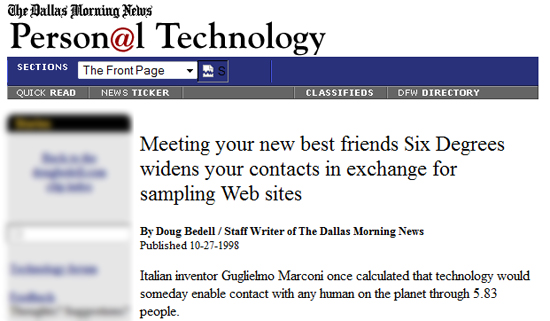The Advancement of Social Media – The History of Social Media Series
 *This is the second post in “History of social media” series. Please see the first part here: Before Social Media: Precursors*
*This is the second post in “History of social media” series. Please see the first part here: Before Social Media: Precursors*
Social media has moved onto a whole new playing field since its’ slow start in the late 1970’s. The creation of more sophisticated software, interactive websites and new ways of sharing information and content have boosted networking to a level that we couldn’t have dreamed of fifteen years ago. That evolution is still occurring today, with things like the integration of ‘Like’ buttons on websites or easy access to profile connection through multiple sites or for content.
Ideas like Foursquare, Pandora, Last.fm, YouTube, Tumblr and more have shown the true ingenuity that has made the Internet a regular part of our daily lives. Both positive advances like the free and open sharing of information has been balanced with the negative of a loss of privacy, and the scandals are as prominent as the new technologies that allow them, such as with the Wikileaks releases over the past year.
But it has been a slow process over the last twenty-something years. Early social media sites were quite different than what you see today.
The Original Social Networks
Theme Forums

Image via Wikipedia
From the days of the Bulletin Board Systems – a form of communicative website logged in to one at a time through a phone line to share files or chat during the 80’s – came the Internet forum. Usually presented as a place to discuss a specific theme, such as a television show, activity or health problem, forums were the first real social networking site type to allow one on one communication, wider posting between members, a profile and building a friends list.
Still prominent today, these sites often still use the original platforms for design, such as phpBB and vBulletin, although simpler methods have been created since. They are also usually part of a wider website schematic, used for customer service, fan conversation or a more interactive way of passing information that simpler FAQ pages.
Dating Sites
Not really a social networking concept in the beginning, they were nevertheless one of the first widely used methods for average people with no real tech experience to get together for a common purpose. Profiles with photos, information and a means of contacting the other person were created to allow you to meet someone in or out of your area for relationships or just adult fun. These are also still used today.
SixDegrees
Many of your will be familiar with SixDegrees. Though not as popular as modern equivalents like Facebook, this was the first social networking site to match up to later creations like Myspace. Socially based, it was a way to meet friends, keep in touch with others, and during the late 90’s it had over a million members. It closed down in 2001 after a major buyout, but it paved the way for what we now recognize as social networking sites now.
Livejournal

It was 1999 when the first major blog site came out. Livejournal was a massive phenomenon and the first step in the blog movement that has become a serious part of Internet culture. Constantly updated and offering profiles, communities and friend locks, it was a great way to keep people you knew updated on the going-ons of your day to day life, or to share special events.
MMORPGs
Massive Multiplayer Online Role Playing Games have become huge in the last few years. The greatest example is Blizzard’s World of Warcraft, an interactive take on the classic Warcraft PC games. Others like Second Life, Nodiatis and Star Trek Online have also become popular. But before that there were other games such as Ultima Online, and even text based game platforms like MUDs (Multi-User Dungeons), which also have a real-time virtual reality element.
First Steps to the Future
These are all the first creations of a wider world of Internet networking activity. You can see how the concept slowly began to form, and from there is has taken over the original functions of the web. It will be exciting to see what other advances are made in years to come.



The past is the key to the future.
Great post!
nice this is really a inspirational article.